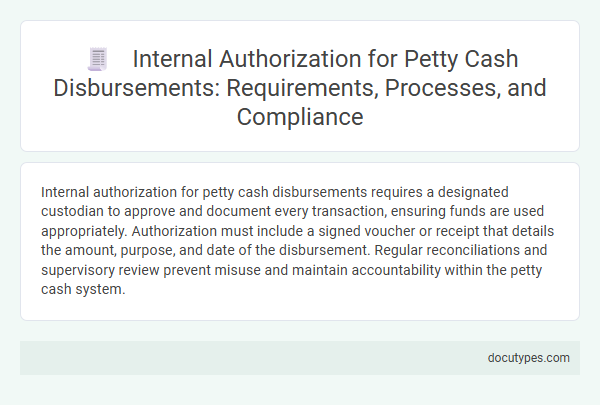Internal authorization for petty cash disbursements requires a designated custodian to approve and document every transaction, ensuring funds are used appropriately. Authorization must include a signed voucher or receipt that details the amount, purpose, and date of the disbursement. Regular reconciliations and supervisory review prevent misuse and maintain accountability within the petty cash system.
Introduction to Internal Authorization for Petty Cash
Internal authorization for petty cash disbursements ensures that all expenses are properly approved before funds are released. This process involves designated personnel verifying requests to maintain financial control and prevent misuse. You must follow your organization's specific authorization protocols to guarantee compliance and accurate record-keeping.
Importance of Petty Cash Management
Internal authorization for petty cash disbursements requires documented approval from designated personnel, typically a supervisor or manager. This ensures that all expenses are legitimate and within the allocated budget.
Effective petty cash management prevents misuse and maintains accurate financial records. You safeguard company assets and improve accountability by enforcing strict authorization controls.
Key Requirements for Petty Cash Authorization
Internal authorization for petty cash disbursements requires formal approval from a designated supervisor or manager to ensure proper control and accountability. Authorization limits are predefined, typically based on the organization's petty cash policy, to prevent unauthorized or excessive withdrawals.
Key requirements include documented approval forms or digital authorization methods that verify the requester's identity and purpose of the disbursement. Mandatory reconciliation and periodic review by the finance department help maintain transparency and compliance with internal financial controls.
Roles and Responsibilities in Authorization
Internal authorization for petty cash disbursements ensures controlled access and accountability within an organization. Clear roles and responsibilities are essential to maintain proper oversight and prevent misuse.
- Custodian Approval - The petty cash custodian must review and approve disbursement requests to verify legitimacy before funds are released.
- Manager Authorization - A designated manager or supervisor must authorize petty cash expenses to confirm alignment with company policies and budgets.
- Finance Department Oversight - The finance team is responsible for regularly auditing petty cash transactions to ensure compliance and accurate record-keeping.
You must adhere to these authorization protocols to safeguard petty cash funds effectively.
Standard Processes for Petty Cash Disbursement
Internal authorization for petty cash disbursements requires approval from designated personnel, ensuring control and accountability. Standard processes mandate documented requests supported by valid receipts or invoices before funds are released.
Petty cash custodians must verify all disbursements against an approved petty cash policy, maintaining accurate records for auditing purposes. Authorization levels are defined based on the amount, with higher amounts requiring supervisor or manager approval. Regular reconciliation of the petty cash fund ensures compliance with internal controls and prevents misuse of funds.
Documentation and Record-Keeping Standards
Internal authorization for petty cash disbursements requires strict adherence to documentation and record-keeping standards to ensure transparency and accountability. Proper authorization prevents misuse and facilitates accurate financial tracking within an organization.
- Approval of Disbursement Requests - Every petty cash withdrawal must be authorized by a designated manager or petty cash custodian before funds are released.
- Receipt and Voucher Submission - All disbursements require original receipts or vouchers that clearly state the purpose and amount of the transaction for audit purposes.
- Regular Reconciliation and Record Maintenance - Accurate records must be maintained and reconciled periodically to confirm that petty cash balances align with documented disbursements.
Internal Controls and Approval Procedures
Internal authorization for petty cash disbursements mandates documented approval from designated personnel to ensure accountability. Effective internal controls require pre-approval of expenses, verification of supporting receipts, and reconciliation of disbursement logs. These procedures minimize the risk of unauthorized spending and maintain accurate financial records within the organization.
Compliance with Company Policies and Regulations
What internal authorization is mandatory for petty cash disbursements to ensure compliance with company policies and regulations? Petty cash disbursements require prior approval from designated department heads or authorized personnel according to the company's financial control policies. This internal authorization process safeguards against misuse and aligns with regulatory standards for financial accountability.
Common Challenges and Solutions in Petty Cash Authorization
| Internal Authorization Mandatory for Petty Cash Disbursements | Authorization typically requires approval from a designated petty cash custodian and a department manager or finance officer. A signed voucher or petty cash request form must be submitted. Limits on disbursement amounts are enforced, ensuring compliance with company policies. Regular reconciliation and audit trails are mandatory for transparency. |
|---|---|
| Common Challenges in Petty Cash Authorization |
|
| Solutions for Effective Petty Cash Authorization |
|
What Internal Authorization Is Mandatory for Petty Cash Disbursements? Infographic

